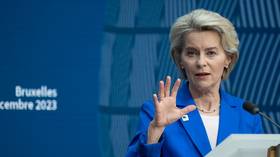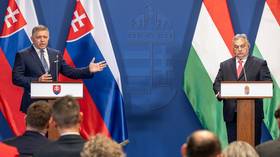Brussels starts ‘screening’ Ukrainian laws

Brussels has announced launching a “screening process and putting together the negotiating framework” as part of negotiations with Ukraine on its ambition to join the EU.
Some member states previously said Kiev was years away from achieving its goal. European Commission President Ursula von der Leyen mentioned the new phase during a Wednesday speech before the European Parliament.
Von der Leyen mentioned the new phase during a speech before MEPs. She mused that when the formal accession process was launched last year, “hearts of millions of Ukrainians were filled with hope and joy” and claimed that Ukrainian lawmakers had made strides in adopting required reforms.
Earlier this week, von der Leyen met Ukrainian President Vladimir Zelensky on the sidelines of the World Economic Forum in Davos, Switzerland. His office said the screening of national legislation was discussed there and will move Ukraine towards full membership.
The EU leadership resorted to unusual political maneuvering when it pushed the start of accession talks through the Council of Europe in December. Hungarian Prime Minister Viktor Orban, a vocal critic of Brussels’ approach to Kiev, left the meeting when the vote was cast. This allowed the EU requirement for unanimous approval to be technically met without him explicitly supporting the decision.
Both Kiev and von der Leyen urged member states to ensure continued funding of the Ukrainian government with European taxpayers’ money. During the same session of the Council, Orban vetoed a Commission proposal to allocate €50 billion ($54 billion) over four years to support Kiev. Budapest wants any funding to be done on an annual basis pending review and be done outside of the joint EU budget.
EU leaders will discuss both issues during an extraordinary summit on February 1. Longterm “stable and substantial financing to Ukraine” is needed to “support the daily functioning of the state, to stabilize the economy, and to bring it closer to our Union,” the Commission head said in her address.
Hungary is not alone in its skepticism about Ukraine’s candidacy. French President Emmanuel Macron, for instance, told domestic media that the EU was “very far” from accepting it as a new member, commenting on the outcome of the December summit.
Meanwhile, the new government in Slovakia has sided with Hungary in its attitude towards Ukraine. Prime Minister Robert Fico called Budapest’s conditions for funding Kiev “rational and sensible” during a visit to Hungary on Tuesday.













